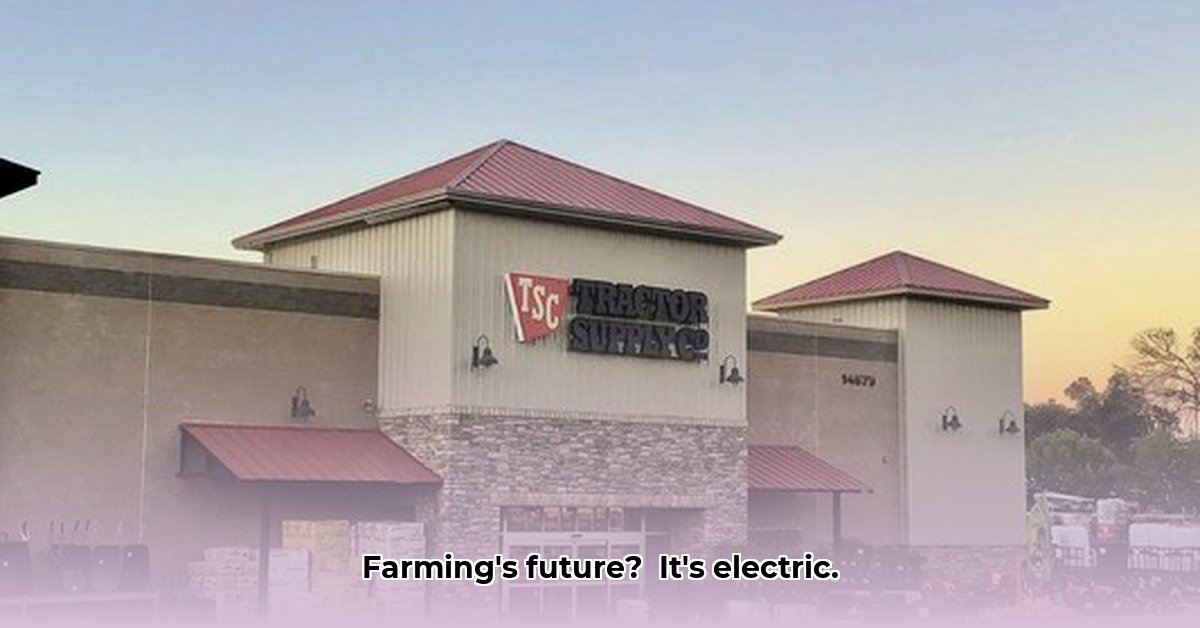
Tractor Supply in Turlock: A Foundation for Sustainable Agriculture
Turlock, California, a region deeply rooted in agricultural heritage, is witnessing a growing movement towards sustainable farming practices. But how can local businesses contribute to this vital shift? This article explores Tractor Supply Company (TSC) in Turlock and its potential to become a significant force in promoting sustainable agriculture within the community. We'll examine TSC's current offerings, explore opportunities for improvement, and highlight the collaborative roles of farmers, consumers, and local government in building a greener future. For more information on TSC's commitment, see their recent statement.
Tractor Supply's Current Contribution
TSC in Turlock serves as a primary source of supplies for local farmers, ranchers, and gardeners. While the store offers essential items like animal feed, fencing, and tools, its current product mix presents a mixed bag regarding sustainability. Many conventional products—pesticides, certain fertilizers, and non-organic seeds—can negatively impact the environment. However, TSC already stocks some sustainable options, such as organic seeds and water-efficient irrigation systems. Increasing the visibility and accessibility of these eco-friendly products is a crucial first step. A wider selection of organic and biodynamic fertilizers would further incentivize farmers to adopt healthier soil management techniques. "The current offerings are a good start, but we need to see a proactive shift towards emphasizing sustainable options," comments Dr. Emily Carter, Professor of Agricultural Sustainability at California State University, Stanislaus.
Opportunities for a Greener TSC: Actionable Steps
The potential for TSC to champion sustainable agriculture in Turlock is substantial. Imagine a store that doesn't just sell sustainable products but actively promotes and educates about eco-friendly practices. This vision involves tangible actions:
Expand Sustainable Product Lines: Significantly increase the range of certified organic seeds, biodynamic fertilizers, and natural pest control options. A 20% increase in organic product offerings could lead to a demonstrable shift in farmer purchasing habits.
Invest in Educational Initiatives: Host regular workshops on composting, water conservation, integrated pest management (IPM), and other sustainable practices. These hands-on sessions, perhaps led by local agricultural experts, could empower farmers to adopt new techniques.
Forge Strategic Partnerships: Collaborate with local organizations specializing in sustainable agriculture to create a vibrant network of knowledge sharing. Joint events, such as workshops and demonstrations, can strengthen community engagement. "Partnering with local experts provides credibility and contextually relevant advice," notes Mr. David Miller, Director, Turlock Sustainability Initiative.
Stakeholder Collaboration: A Shared Harvest
Building a sustainable agricultural system requires a coordinated effort involving diverse stakeholders:
- TSC Management: Proactively expand sustainable product lines, invest in employee training on sustainable agriculture, and partner with local organizations.
- Farmers: Actively seek sustainable products, participate in educational initiatives, and adopt environmentally friendly farming practices.
- Consumers: Demand transparency and choose sustainable options whenever possible, supporting local farms and TSC's sustainability initiatives.
- Local Government: Create incentives for sustainable agriculture, support educational efforts, and develop comprehensive sustainability plans for the agricultural sector.
Challenges and Risk Mitigation
The transition to sustainable agriculture faces challenges. The higher initial cost of organic inputs can be a barrier for some farmers. A thorough risk assessment framework is needed to mitigate potential setbacks. TSC can play a vital role in offering financial assistance programs or partnering with organizations to secure funding for education and training. Open communication and collaboration are crucial to overcome these obstacles. "A well-defined risk assessment, coupled with proactive mitigation strategies, is essential," confirms Dr. Maria Rodriguez, Agricultural Economist at UC Davis.
A Sustainable Future: Reaping the Rewards
Tractor Supply Company in Turlock holds the potential to become a transformative force in the local agricultural landscape. By embracing sustainable practices and actively promoting them within the community, TSC can create a more environmentally responsible, economically resilient, and socially equitable food system. The journey towards sustainability requires consistent effort, but the potential rewards—environmental preservation, economic growth, and enhanced community well-being—are substantial. The question isn't if this transformation can happen, but how we can collectively build a sustainable future for Turlock's farms, with TSC playing a central role.